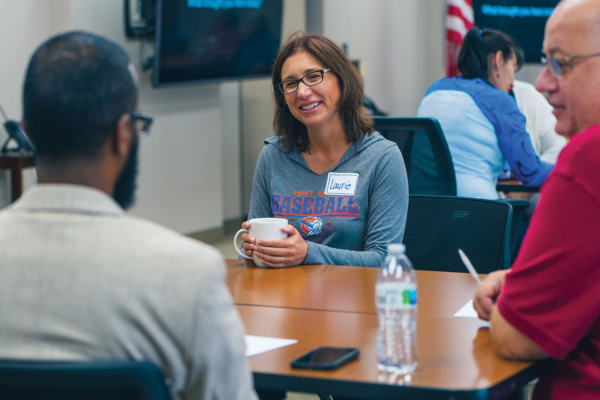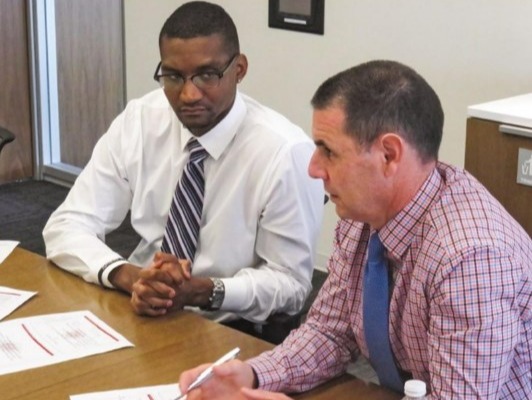Reforming Discipline in Madison Metropolitan School District: Improving the Process to Improve the Outcomes
November 28, 2016
Superintendent Jennifer Cheatham has led the Madison Metropolitan School District (MMSD) in Wisconsin since April 2013. Under her leadership, MMSD continues to evolve its school discipline practices in order to improve outcomes for children and strengthen the community.
Old zero-tolerance policies and overreliance on exclusionary practices have increasingly been replaced with new developmentally-appropriate policies and reliance on restorative practices. Thus, fewer MMSD students are receiving out-of-school suspensions (OSS) and the K-12 staff is becoming better equipped to respond effectively to their behavior and meet both their academic and social-emotional needs.
How did the Madison Metropolitan School District approach this work?
Superintendent Cheatham shared that it started with identifying the problem:
“When I initially started, I went through a listening and learning phase like many, if not all, superintendents do in their first months on the job.”
One of many things Superintendent Cheatham began to understand was concern about the punishment-focused code of conduct:
“It was highly exclusionary with significant dependence on suspension and expulsion and totally void of articulated proactive strategies and interventions. For example, a first fight could end up in as few as no days or up to a five-day suspension. If a student engaged in two more fights or even two different 300-level events, then that would result in an automatic recommendation for expulsion. As you might imagine, the outcomes were pretty abysmal.”
“To understand MMSD’s data, we reviewed as far back as 2011-2012. At that time, we had approximately 27,000 students enrolled and about 4,300 out-of-school suspensions. The vast majority of those suspensions, almost 3,000, were given to African-American students. So it was a real problem.”
Superintendent Cheatham also explained that MMSD’s school board raised concerns about the code of conduct for her early on, and she gave the board kudos for doing so. For other districts it might be external pressure from a community organization or the Office of Civil Rights that initiates change, but the school board was troubled because its members were personally having to approve expulsions on a regular basis and were disturbed by what they were seeing.
Superintendent Cheatham believes an initial theory of change is needed: MMSD’s improvement strategy is captured in its Strategic Framework; school discipline is a critically important component of this larger plan.
“My advice would be never to treat or address school discipline issues in a vacuum. It must be tightly connected to the way we interact with students and families instructionally. So that is first and foremost. The work related to behavior is not separate and should be integrated into instructional design. We are committed to disrupting disparities in our school district and in our community. We are committed to making sure that every child is challenged in the classroom and feels a deep sense of belonging.”
Finally, Superintendent Cheatham underscored the importance, before choosing a strategy and developing a plan, of consulting with the local community and national experts as part of the planning process:
“In addition to consultation with our community – our community organizations, community members, parents, students, teachers, we consulted with experts, including the American Institutes for Research. We wanted our Board to hear more about what was happening nationally and to really understand the issues at a deeper level and see them within a larger context. At the time, MMSD studied Districts such as Baltimore and Cleveland.”
Ultimately, Superintendent Cheatham believes that it is critical to scan what was happening nationally to understand more about what was working and what was not working.
Superintendent Cheatham explained that to improve school discipline and climate, it is important to lay the groundwork to create a firm foundation and strategically build up.
Her process included the following steps:
Community Input
Once MMSD started to explore school discipline and climate issues, it brought community groups, parents, and students into the fold to help MMSD understand the issues more deeply. This created better understanding, gathered community input, and garnered support for making policy change.
Ad Hoc Committee
Beginning in the fall of 2013, an ad hoc committee of the board investigated the issues, which included examining the code of conduct. About six months later they finished creating a new plan – the Behavior Education Plan (BEP) – based on progressive discipline and restorative justice.
Review, Revise, and Expand Reform Efforts
In MMSD, there had already been a fairly long investment in proactive strategies when it came to student discipline. The process by which strategies were selected was really about bringing to scale the effective practices that already existed in MMSD: district-wide deep investment in positive behavioral interventions and supports (PBIS) and “a saturation plan to make sure that every single teacher is trained in Responsive Classroom and/or Developmental Designs classroom management practices.”
MMSD also uses social-emotional learning curriculum in kindergarten through eighth grade and has continued to implement it districtwide. Additionally, at the high school level, there was already some very successful restorative work happening, particularly an investment in restorative circles, which MMSD has since enhanced and expanded district-wide to build a stronger, more consistent, and coherent approach to implementation.
Working with the National Equity Project to Address Implicit Bias
Superintendent Cheatham noted:
“For us, a major challenge is related to African American students’ current lack of a deep sense of belonging in the classroom. As a district, MMSD has been really grappling with student engagement, more specifically a student’s sense of belonging at school. Undergirding all of the work that we are doing as a district is what we are doing on racial equity and implicit bias. We’ve been working with the National Equity Project beginning with school leaders, all central office staff, principals, instructional coaches, deans, assistant principals, and other teacher leaders to understand implicit bias at a deep level, to recognize it within ourselves and do our own personal work. We are learning how to create spaces where we can slow things down and press the pause button before making critical decisions about children.”
Once strategies are in place, it is important to keep the feedback loop open and have periodic review of progress. In MMSD, various modes of gathering input and feedback are used when planning to do something, of significance.
There is a structured, disciplined review cycle. For example, MMSD hosts open forum opportunities in the evenings for community members to come and speak; the forums are usually in an attendance area and refreshments are served.
MMSD also uses online surveys or feedback forms to gather information from people who are unable to attend forums.
Also, focus groups are very important when it comes to student voice. MMSD has held focus groups with a range of students in every single middle school and high school.
MMSD uses this process to reflect annually. MMSD also works to keep the board informed with quarterly reports on progress with student discipline, both implementation and outcomes. There is also a mid-year public board meeting to check in on how things are going.
Lastly, there is an end-of-the-year public board meeting to make adjustments to the policy itself. Changes are made based on what was learned and then budget revisions and practice improvements follow. After the annual review process is completed, it starts again with gathering student and community feedback.
Importantly, MMSD intentionally reaches out to major social justice-oriented groups like the NAACP and the YWCA. It has worked well to collaborate with community leaders and coalitions.
Superintendent Cheatham shared a cautionary tale:
“I think we did a great job creating a coalition of support in order to get our new policy passed. I think we made a tactical error in not keeping that coalition engaged through our first year of implementation.”
She advised that when you begin the hard work of implementation and people are unhappy about the change, it is beneficial to have a strong coalition helping to problem solve along the way. Thus, MMSD course corrected and reestablished the coalition this past year.
Superintendent Cheatham explained:
“We invited that group back together. So we have a coalition on restorative practice and student discipline that includes union representation, the police, various social justice groups, teacher representation, and parent representation...a fairly broad-based group. There may be 40 members, and we meet regularly with them to help us solve problems together.”
Students and Out-of-School Suspensions
As a part of this shift to address both behavior and instruction, the Behavior Education Plan (BEP) was introduced for the first time in the 2014-15 school year.
The BEP makes it harder to suspend students overall, especially in grades K-3. In 2014-15, there were no suspensions in grades K-1 and only 15 total in grades 2-3.
Over the past five years, out-of-school suspensions have decreased considerably.
“From 2013-14 to 2014-15 alone, out of school suspensions declined more than 40%.”
Days of lost instruction due to out-of-school suspensions also have declined.
“More than 1900 fewer days of instruction were lost in 2014-15 relative to 2013-14, equivalent to more than 10 full school years of instruction.”
While out-of-school suspensions decreased, there were increases in some racial/ethnic disproportionalities. For example, Black students only comprise 18% of MMSD, but in 2013-14, 59% of OSS were Black students, and in 2014-15 it was 62%. MMSD recognizes the tension between the reduction in OSS and the persistence in disproportionality.
Superintendent Cheatham explained:
“The reduction in and of itself should never be underestimated. I mean this is really important progress, but the real work is about influencing the disproportionality. We are making assumptions about children and families, and slowing down the process and trying to take a step back before making those snap judgments. It is the only way we’re really going to start to impact disproportionality numbers.”
Teachers
Teachers continue to build on their skills and work through the change process in MMSD. Superintendent Cheatham explained:
“This is not just about instituting a new policy that doesn’t allow you to suspend or expel, but it’s about utilizing these strategies that make us less reliant on suspension and expulsion. So I think that’s positive. I think that what we’re seeing is the classrooms that are most deeply trained in responsive classrooms and developmental designs as well as restorative practices are calling less for support in the classroom when it comes to discipline. It reinforces the need to expand and deepen that training district-wide. Similarly we are seeing that schools that are regularly using circle practices are demonstrating higher rates on staff climate indicators as well as student climate indicators. I think that’s been important and also a challenge and a major area of learning for us. How do you do this work while helping staff feel supported? That’s been our biggest struggle. And the fact that the schools that are using these practices with more intensity and focus, staff members are feeling more supported. That’s good.”
With Superintendent Cheatham at the helm, MMSD has made significant progress in decreasing OSS overall and improving school climate.
MMSD intends to work on continuous improvement and constant refinement so that the district can respond to the needs of its children.
Superintendent Cheatham noted:
“This is really about changing mindsets, values and beliefs about children and the relationship between adults and children. So I invite everyone to talk more honestly about that because it’s messy, and it’s the long-term work that we really need to be doing together.”
Advertisement
Advertisement
Advertisement
Advertisement



